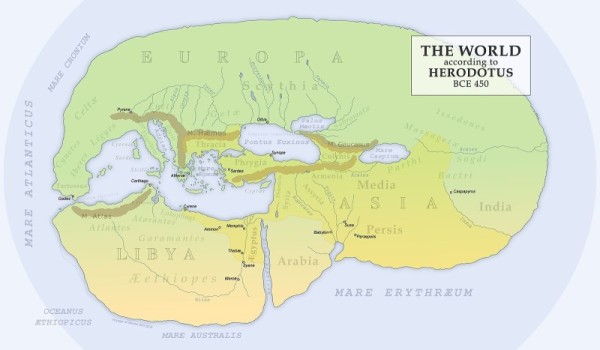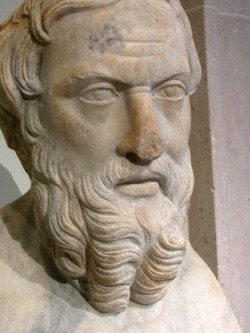So far then the Persians had the advantage for a small part of the war.

Translated by George C. Macaulay — our special project presenting the complete Herodotus with URLs for all of those people, places, events, and things which baffles and discourages modern readers.
Previously on Herodotus
128. The herald then had departed to report this to Darius; and the kings of the Scythians, having heard mention of subjection to a master, were filled with wrath. They sent accordingly the division which was appointed to be joined with the Sauromatai, that division of which Scopasis was in command, bidding them come to speech with the Ionians, namely those who were guarding the bridge of the Ister, and meanwhile they who were left behind resolved not to lead the Persians wandering about any more, but to attack them constantly as they were getting provisions. Therefore they observed the soldiers of Darius as they got provisions, and did that which they had determined: and the cavalry of the Scythians always routed that of the enemy, but the Persian horsemen as they fled fell back upon the men on foot, and these would come up to their assistance; and meanwhile the Scythians when they had driven in the cavalry turned back, fearing the men on foot. Also by night the Scythians used to make similar attacks:
129, and the thing which, strange to say, most helped the Persians and hindered the Scythians in their attacks upon the camp of Darius, I will mention, namely the voice of the asses and the appearance of the mules; for Scythia produces neither ass nor mule, as I have declared before, nor is there at all in the Scythian country either ass or mule on account of the cold. The asses accordingly by riotously braying used to throw into confusion the cavalry of the Scythians; and often, as they were in the middle of riding against the Persians, when the horses heard the voice of the asses they turned back in confusion and were possessed with wonder, pricking up their ears, because they had never heard such a voice nor seen the form of the creature before.
130. So far then the Persians had the advantage for a small part of the war. But the Scythians, whenever they saw that the Persians were disquieted, then in order that they might remain a longer time in Scythia and in remaining might suffer by being in want of everything, would leave some of their own cattle behind with the herdsmen, while they themselves rode out of the way to another place, and the Persians would come upon the cattle and take them, and having taken them they were elated at what they had done.
131. As this happened often, at length Darius began to be in straits; and the kings of the Scythians perceiving this sent a herald bearing as gifts to Darius a bird and a mouse and a frog and five arrows. The Persians accordingly asked the bearer of the gifts as to the meaning of the gifts which were offered; but he said that nothing more had been commanded to him but to give them and get away as speedily as possible; and he bade the Persians find out for themselves, if they had wisdom, that which the gifts were meant to express.
132. Having heard this the Persians took counsel with one another; and the opinion of Darius was that the Scythians were giving to him both themselves and also earth and water, making his conjecture by this, namely that a mouse is produced in the earth and feeds on the same produce of the earth as man, and a frog in the water, while a bird has great resemblance to a horse; and moreover that in giving the arrows they were delivering up their own might in battle. This was the opinion expressed by Darius; but the opinion of Gobryas, one of the seven men who killed the Magian, was at variance with it, for he conjectured that the gifts expressed this:
Unless ye become birds and fly up into the heaven, O Persians, or become mice and sink down under the earth, or become frogs and leap into the lakes, ye shall not return back home, but shall be smitten by these arrows.

CC BY-SA 2.0 image from Wikipedia.
133. The Persians then, I say, were making conjecture of the gifts: and meanwhile the single division of the Scythians, that which had been appointed at first to keep guard along the Maiotian lake and then to go to the Ister and come to speech with the Ionians, when they arrived at the bridge spoke as follows:
Ionians, we have come bringing you freedom, if at least ye are willing to listen to us; for we are informed that Darius gave you command to guard the bridge for sixty days only, and then, if he had not arrived within that time, to get you away to your own land. Now therefore, if ye do as we say, ye will be without blame from his part and without blame also from ours: stay the appointed days and then after that get you away.
They then, when the Ionians had engaged themselves to do this, hastened back again by the quickest way:
134, and meanwhile, after the coming of the gifts to Darius, the Scythians who were left had arrayed themselves against the Persians with both foot and horse, meaning to engage battle. Now when the Scythians had been placed in battle-array, a hare darted through them into the space between the two armies, and each company of them, as they saw the hare, began to run after it. When the Scythians were thus thrown into disorder and were raising loud cries, Darius asked what was this clamour arising from the enemy; and hearing that they were running after the hare, he said to those men to whom he was wont to say things at other times:
These men have very slight regard for us, and I perceive now that Gobryas spoke rightly about the Scythian gifts. Seeing then that now I myself too think that things are so, we have need of good counsel, in order that our retreat homewards may be safely made.
To this replied Gobryas and said:
O king, even by report I was almost assured of the difficulty of dealing with these men; and when I came I learnt it still more thoroughly, since I saw that they were mocking us. Now therefore my opinion is, that as soon as night comes on, we kindle the camp-fires as we are wont to do at other times also, and deceive with a false tale those of our men who are weakest to endure hardships, and tie up all the asses and get us away, before either the Scythians make for the Ister to destroy the bridge or something be resolved by the Ionians which may be our ruin.
– Herodotus, Book IV
| <—Previous | Master List | Next—> |
Herodotus made his living by being interesting. In a world where most people did not read and could not afford to buy a book even if they could, they would pay to listen to Herodotus recite from his books. They would not pay to be bored. In that world, the names that populate his stories would have some general familiarity to his audience. Their obscurity to us is a barrier that this series seeks to break down.
MORE INFORMATION
MAP LIBRARY
Because of lack of detail in maps as embedded images, we are providing links instead, enabling readers to view them full screen.

Leave a Reply
You must be logged in to post a comment.